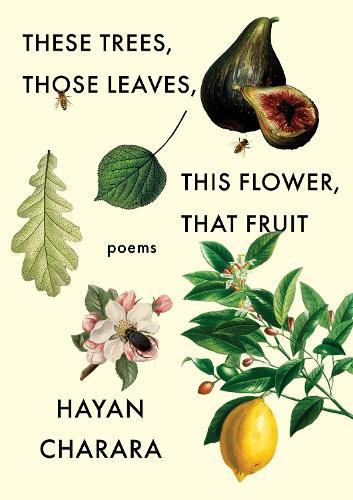Readings Newsletter
Become a Readings Member to make your shopping experience even easier.
Sign in or sign up for free!
You’re not far away from qualifying for FREE standard shipping within Australia
You’ve qualified for FREE standard shipping within Australia
The cart is loading…






A thoughtful new collection of poems, one that deconstructs the deceptively simple question of what it means to be good-a good person, a good citizen, a good teacher, a good poet, a good father.
With These Trees, Those Leaves, This Flower, That Fruit, Hayan Charara presents readers with a medley of ambitious analyses, written in characteristically wry verse. He takes philosophers to task, jousts with academics, and scrutinizes hollow gestures of empathy, exposing the dangers of thinking ourselves separate / from [our] thoughts and experiences. After all, No work of love / will flourish out of guilt, fear, or hollowness of heart. But how do we act on fullness of heart? How, knowing as we do that genocide is inscribed in our earliest and holiest texts ?
Thoughtful but never preachy, Charara sits beside us, granting us access to life’s countless unglamorous dilemmas: crushing a spider when we promised we wouldn’t, nearing madness from a newborn’s weeping, resenting our lovers for what happened in a dream. Good poems demand to be written from inside the poet, we are reminded. And that is where we find ourselves here: inside a lively and ethical mind, entertained by Charara’s good company even as goodness challenges us to do more.
$9.00 standard shipping within Australia
FREE standard shipping within Australia for orders over $100.00
Express & International shipping calculated at checkout
A thoughtful new collection of poems, one that deconstructs the deceptively simple question of what it means to be good-a good person, a good citizen, a good teacher, a good poet, a good father.
With These Trees, Those Leaves, This Flower, That Fruit, Hayan Charara presents readers with a medley of ambitious analyses, written in characteristically wry verse. He takes philosophers to task, jousts with academics, and scrutinizes hollow gestures of empathy, exposing the dangers of thinking ourselves separate / from [our] thoughts and experiences. After all, No work of love / will flourish out of guilt, fear, or hollowness of heart. But how do we act on fullness of heart? How, knowing as we do that genocide is inscribed in our earliest and holiest texts ?
Thoughtful but never preachy, Charara sits beside us, granting us access to life’s countless unglamorous dilemmas: crushing a spider when we promised we wouldn’t, nearing madness from a newborn’s weeping, resenting our lovers for what happened in a dream. Good poems demand to be written from inside the poet, we are reminded. And that is where we find ourselves here: inside a lively and ethical mind, entertained by Charara’s good company even as goodness challenges us to do more.